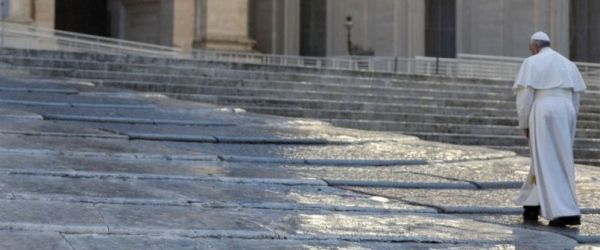Today’s passage from the Gospel (cf. Mt 20:1-16) recounts the parable of the labourers called to put in a day’s work by the owner of the vineyard. Through this narrative, Jesus shows us the surprising way God acts, represented by two of the owner’s attitudes: the call and the recompense.
First of all, the call. Five times the owner of the vineyard goes out and calls people to work for him: at six, at nine, at twelve, at three and at five in the afternoon. The image of this owner, who goes out numerous times to look for day labourers for his vineyard, is touching. That owner represents God who calls everyone and calls always, at any hour. Even today, God acts this way: he continues to call anyone, at whatever hour, to invite them to work in his Kingdom. This is God’s way, which, in our turn, we are called to receive and to imitate. He does not stay shut in within his world, but “goes out”: God always goes out, in search of us; he is not closed up — God goes out. He continually seeks out people, because he does not want anyone to be excluded from his loving plan.
Our communities are also called to go out to the various types of “boundaries” that there might be, to offer everyone the word of salvation that Jesus came to bring. It means being open to horizons in life that offer hope to those stationed on the existential peripheries, who have not yet experienced, or have lost, the strength and the light that comes with meeting Christ. The Church needs to be like God: always going out; and when the Church does not go out, she becomes sick with the many evils we have in the Church. And why are these illnesses in the Church? Because she does not go out. It is true that when someone goes out there is the danger of getting into an accident. But better a Church that gets into accidents because she goes out to proclaim the Gospel, than a Church that is sick because she stays in. God always goes out because he is a Father, because he loves. The Church must do the same: always go out.
The owner’s second attitude, representing God’s, is his way of compensating the workers. How does God pay? The owner agrees to “one denarius” (v. 2) with the first workers he hired in the morning. Instead, to those he hired later, he says: “Whatever is right I will give you” (v. 4). At the end of the day, the owner of the vineyard orders that everyone be given the same pay, that is, one denarius. Those who had worked since morning are outraged and complain against the owner, but he insists: he wants to give the maximum pay to everyone, even to those who arrived last (vv. 8-15). God always pays the maximum amount: he does not pay halfway. He pays everything. Here we understand that Jesus is not speaking about work and fair wages — that is another problem — but about the Kingdom of God and the goodness of the heavenly Father who goes out continually to invite, and he pays everyone the maximum amount.
In fact, God behaves like this: he does not look at the time and at the results, but at the availability; he looks at the generosity with which we put ourselves at his service. His way of acting is more than just, in the sense that it goes beyond justice and is manifested in Grace. Everything is Grace. Our salvation is Grace. Our holiness is Grace. In giving us Grace, he bestows on us more than what we merit. And so, those who reason using human logic, that is, the logic of the merits acquired through one’s own greatness, from being first, find themselves last. “But, I have worked a lot, I have done so much in the Church, I have helped a lot and they pay me the same as this person who arrived last…”. Let us remember who was the first canonized saint in the Church: the Good Thief. He “stole” Paradise at the last minute of his life: this is Grace. This is what God is like, even with us. Instead, those who seek thinking of their own merits fail; those who humbly entrust themselves to the Father’s mercy, rather than being last — like the Good Thief — find themselves first (cf. v. 16).
May Mary Most Holy help us to feel every day the joy and wonder of being called by God to work for him, in his field which is the world, in his vineyard which is the Church. And to have as our only recompense his love, friendship with Jesus.
[Pope Francis, Angelus 20 September 2020]












